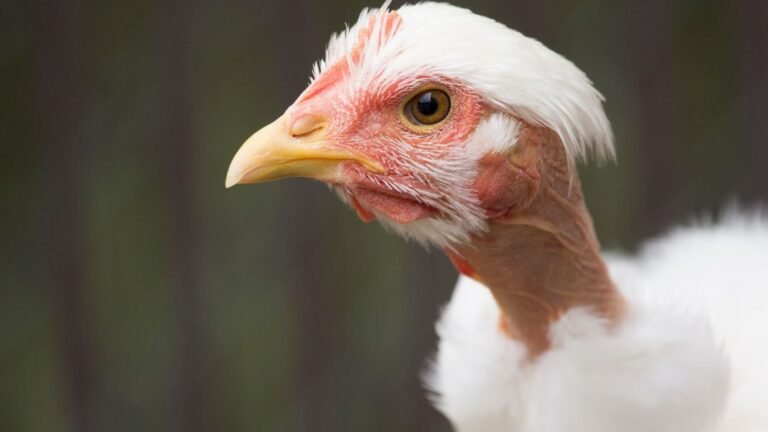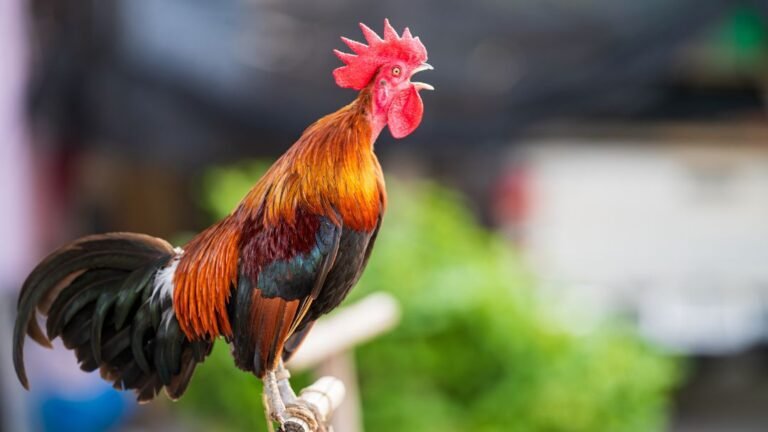Chicken health is essential for maintaining high-quality eggs. This guide provides accurate and concise information on how to ensure the health of your chickens and improve the overall quality of your eggs.
Introducing good practices to promote chicken health is crucial for egg production. Healthy chickens are more likely to lay high-quality eggs, making it vital to prioritize their well-being. We will explore various aspects of chicken health, ranging from nutrition to disease prevention.
Implementing these guidelines will not only ensure the longevity and vigor of your flock but also result in eggcellent eggs. So, let’s delve into the world of chicken health and understand how it directly impacts the quality of eggs your chickens produce.
Understanding Chicken Health
HTML CODE STARTSUnderstanding Chicken Health is crucial for ensuring optimal egg production in your backyard flock. Healthy chickens lay more eggs and are less prone to diseases, keeping your egg supply consistent and your chickens happy. In this article, we will delve into the importance of chicken health, common health issues that chickens may face, and the role of natural methods in boosting chicken health.
Importance Of Chicken Health For Optimal Egg Production
Chicken health plays a vital role in achieving optimal egg production. Healthy chickens are more likely to lay a higher number of eggs, ensuring a steady supply for you and your family. When chickens are unwell, their bodies divert resources away from egg production towards fighting off diseases, resulting in reduced egg yields.
Furthermore, healthy chickens are also less likely to experience egg-related problems such as thin-shelled or misshapen eggs. By prioritizing chicken health, not only do you ensure a regular supply of fresh eggs, but also maintain the quality and integrity of the eggs.
Common Health Issues In Chickens
Chickens, like any other living beings, are susceptible to various health issues. Understanding these common health problems can help you identify and address them promptly, ensuring the well-being of your flock.
Some of the most prevalent health issues in chickens include:
- Infectious diseases such as avian influenza and coccidiosis
- Respiratory problems like respiratory infections and mycoplasmosis
- Parasites such as mites, lice, and worms
- Nutritional deficiencies and imbalances
Monitoring your chickens regularly for any signs of illness and taking appropriate measures can help prevent these health issues and promote a robust flock.
The Role Of Natural Methods In Boosting Chicken Health
While conventional treatments and medications are available for treating chicken health problems, natural methods can also play a significant role in bolstering the overall health of your chickens.
Natural methods can include:
- Providing a balanced and nutritious diet consisting of quality poultry feed
- Ensuring access to clean and fresh water at all times
- Implementing proper sanitation practices to maintain a clean coop environment
- Encouraging regular exercise through free-ranging or providing ample space in the coop
- Using herbal remedies and supplements known for their immune-boosting properties
Adopting these natural methods can help strengthen the immune system of your flock and reduce the risk of diseases. It is important to note that natural methods should not replace veterinary care, but rather serve as complementary measures to promote optimal chicken health.
HTML CODE ENDSImplementing A Nutritious Diet
Implementing a nutritious diet is vital for maintaining the health and well-being of your chickens. Just like humans, chickens also require a balanced and wholesome diet to thrive. By providing them with the right feed and essential nutrients, you can ensure that they stay healthy, active, and productive.
Choosing The Right Feed For Healthy Chickens
When it comes to choosing the right feed for your chickens, it’s important to opt for varieties that are specifically formulated to meet their nutritional needs. There are various types of chicken feeds available in the market, ranging from pellets to mash, crumbles, and more. It’s crucial to select a feed that suits the age and breed of your chickens.
Additionally, consider the ingredients used in the feed. Look for feeds that are rich in protein, vitamins, and minerals. These nutrients are essential for promoting proper growth and development, as well as for supporting various bodily functions.
Incorporating Essential Nutrients In The Diet
In order to ensure the overall well-being of your chickens, it’s important to incorporate essential nutrients into their diet. This includes providing them with a diverse range of foods that are packed with the necessary vitamins and minerals.
One effective way to achieve this is by offering them a mix of commercial feed, fresh greens, and kitchen scraps. Commercial feed provides a balanced base, while fresh greens such as lettuce, spinach, and kale add an extra dose of vitamins and minerals. Additionally, kitchen scraps like vegetables, fruits, and even eggshells can be given to the chickens as a supplement.
Moreover, it is crucial to always ensure a clean and fresh water supply for your chickens. Hydration is key to maintaining their health and supporting their digestive system. Regularly check their water supply and ensure it is free from contaminants.
The Benefits Of Organic And Non-gmo Feed Options
Organic and non-GMO feed options can have numerous benefits when it comes to promoting the health of your chickens. These feeds are produced without the use of synthetic pesticides, herbicides, or genetically modified organisms. By opting for organic and non-GMO feeds, you can provide your chickens with a diet that is free from potentially harmful chemicals.
Furthermore, organic and non-GMO feeds often have higher nutritional values compared to conventional feeds. They are packed with essential vitamins, minerals, and antioxidants that can boost the chickens’ overall well-being and immune system.
Choosing organic and non-GMO feed options not only benefits your chickens but also contributes to sustainable and environmentally-friendly practices. By supporting organic and non-GMO farming, you are promoting healthier ecosystems and reducing the impact on the environment.
Implementing a nutritious diet for your chickens is an investment in their health and productivity. By choosing the right feed, incorporating essential nutrients, and considering organic and non-GMO options, you can ensure that your chickens lead a healthy and fulfilling life.
Maintaining A Clean Environment
Maintaining a clean environment is crucial for the overall health and well-being of your chickens. A clean coop and run area not only prevent the spread of diseases but also ensure that your chickens are comfortable and happy. Additionally, a clean environment can help maximize egg production. In this section, we will discuss the importance of a clean coop and run area, strategies for preventing and controlling pests, and effective methods for managing chicken waste.Importance Of A Clean Coop And Run Area
Keeping your chicken coop and run area clean is essential for several reasons. It helps prevent the buildup of bacteria and parasites, which can cause various diseases. A clean environment also minimizes the risk of contamination and provides a healthier living space for chickens. Moreover, a clean coop reduces unpleasant odors and makes chicken care more enjoyable for both you and your feathered friends.Strategies For Preventing And Controlling Pests
Pests like flies, mites, and rodents can be a nuisance and a threat to chicken health. Implementing effective strategies for preventing and controlling pests is crucial. Here are some proven methods:1. Regular Cleaning: Regularly clean your coop and run area, removing any debris or standing water that may attract pests.2. Proper Storage: Store chicken feed in tightly sealed containers to prevent pests from accessing it.3. Natural Predators: Encourage the presence of natural predators like cats or owls to help control rodent populations.4. Bug-Free Zone: Keep vegetation around the coop trimmed and remove any standing water sources to reduce the number of insects.Effective Methods For Managing Chicken Waste
Chicken waste, also known as manure, can accumulate quickly and create an unhygienic environment. Properly managing chicken waste not only helps maintain a clean coop but also turns it into a valuable resource. Consider the following methods:1. Regular Removal: Regularly clean the coop and run area, removing waste to reduce the chances of bacteria growth.2. Composting: Repurpose chicken waste by creating a compost pile. This will not only help manage waste but also produce nutrient-rich compost for your garden.3. Deep Litter Method: The deep litter method involves adding layers of carbon-rich materials like straw, leaves, or wood shavings to the coop floor. As the litter breaks down, it helps control odors and provides insulation.4. Proper Ventilation: Good airflow helps dry out the coop, reducing moisture levels and preventing waste from accumulating quickly.By adhering to the strategies and methods mentioned above, you can create a clean and healthy environment for your chickens, enhancing their overall well-being and ensuring a steady supply of fresh and nutritious eggs.Natural Remedies For Common Health Issues
Chickens, like any other living beings, can experience health issues from time to time. While commercial medications are readily available, many chicken owners prefer to take a more natural approach to treat common health problems. Natural remedies offer a gentle and effective way to support your chickens’ well-being without the use of harsh chemicals. In this article, we will explore some natural solutions for common health issues that your feathered friends might encounter.
Herbal Supplements For Immune System Support
Your chicken’s immune system plays a crucial role in defending against diseases and infections. Providing herbal supplements can help boost their immune system naturally. Here are some popular herbal supplements used for immune support:
- Echinacea: This herb is widely known for its immune-boosting properties. It can be administered as a dried herb in their feed or added to their water.
- Garlic: Garlic is a powerful natural antibiotic and immune stimulant. Adding minced garlic to their feed or water can support their immune system and help fight infections.
- Turmeric: Turmeric contains a compound called curcumin, known for its anti-inflammatory and antioxidant properties. Mixing a small amount of turmeric powder in their feed can promote overall health and wellness.
Homeopathic Remedies For Respiratory Problems
Respiratory problems are common in chickens and can cause coughing, sneezing, and difficulty breathing. Homeopathic remedies can provide relief and support their respiratory health. Here are some homeopathic remedies for respiratory problems:
- Antimonium tartaricum 30C: This remedy can help with a rattling cough and difficulty breathing. It is administered in pellet form or diluted in their drinking water.
- Hepar sulphuris 30C: This remedy is beneficial for respiratory infections with a loose cough, wheezing, and nasal congestion. It can be given in pellet form or diluted in their drinking water.
- Kali carbonicum 30C: This remedy is suitable for chickens with respiratory issues accompanied by weakness, loss of appetite, and low energy. It can be administered in pellet form or diluted in their drinking water.
Natural Solutions For Parasite Control
Parasites like mites, lice, and worms can cause discomfort and health problems in chickens. Instead of relying solely on commercial chemical treatments, consider these natural alternatives for parasite control:
| Parasite | Natural Solution |
|---|---|
| Mites and Lice | Diatomaceous earth: Sprinkle food-grade diatomaceous earth in their coop and nesting areas to help control mite and lice infestations. |
| Internal Worms | Herbal wormers: Herbs like garlic, wormwood, and pumpkin seeds have natural anti-parasitic properties and can be used as a preventative measure against internal worms. |
| External Parasites | Herbal sprays: Create a homemade herbal spray using essential oils like neem, lavender, and eucalyptus to repel external parasites like fleas and ticks. |
These natural solutions offer safe and effective methods to manage common health issues in chickens. Always consult with a veterinarian or experienced poultry keeper before starting any new treatment or supplement. With proper care and natural remedies, you can help your feathered friends stay healthy and thriving.
Promoting Mental And Emotional Well-being
Just like humans, chickens can experience stress, boredom, and behavioral issues that can affect their overall health and well-being. Promoting mental and emotional well-being in chickens is crucial to ensure they lead happy and fulfilling lives. In this guide, we will explore some key strategies for creating a stress-free environment, providing enrichment activities, and preventing and treating behavioral issues in chickens.
Creating A Stress-free Environment For Chickens
Creating a stress-free environment is essential for maintaining the mental and emotional health of your chickens. Stress can weaken their immune system and make them more vulnerable to diseases. To promote a calm and relaxing environment for your flock, consider the following:
- Provide ample space: Chickens need sufficient space to roam freely. Overcrowding can lead to stress and aggression among the flock. Ensure each chicken has enough room to move around comfortably.
- Good ventilation: Proper ventilation is crucial to maintain good air quality in the coop. Stale air can create a stressful environment and contribute to respiratory problems. Install vents or windows to facilitate air circulation.
- Ensure cleanliness: Regularly clean the coop to eliminate dirt, waste, and pests. Filthy conditions can lead to stress and compromise the health of your chickens.
- Avoid sudden noise and disturbances: Loud noises and sudden disturbances can startle chickens and cause stress. Keep their surroundings peaceful and limit loud activities near the coop.
- Create a comfortable roosting area: Chickens need a comfortable space to rest and sleep. Provide roosting bars at various heights to cater to their preferences.
Enrichment Activities To Keep Chickens Happy And Entertained
Enrichment activities play a vital role in keeping chickens mentally stimulated, happy, and entertained. Here are some ideas to keep your flock engaged:
- Outdoor foraging: Allow your chickens to free-range in a safe and secure area. They will enjoy exploring and foraging for insects, worms, and grass, which provides mental stimulation and satisfies their natural instincts.
- Provide puzzle feeders: Engage your chickens’ minds by providing puzzle feeders that require them to work for their food. These feeders can be as simple as a hanging treat dispenser or as complex as a rotating puzzle.
- Hang up mirrors: Chickens are social animals and enjoy the presence of their peers. Hanging up small mirrors in the coop can provide visual stimulation and make them feel as if they are in the presence of other chickens.
- Introduce a dust bath: Chickens love to take dust baths, and it’s not just for cleanliness. Dust baths provide a natural and enjoyable activity that helps chickens relax and keeps them entertained.
Strategies For Preventing And Treating Behavioral Issues
Issues such as aggression, feather picking, and egg eating can arise in chicken flocks. Here are some strategies to prevent and treat behavioral issues:
- Provide a balanced diet: Ensure your chickens are receiving a well-balanced diet to meet their nutritional needs. A lack of essential nutrients can contribute to behavioral issues.
- Address overcrowding: Overcrowding can lead to increased stress and aggressive behavior. If you notice behavioral issues, consider providing more space for your chickens.
- Identify and remove problem individuals: If you have specific chickens that are causing issues, separate or rehome them to decrease stress and restore harmony in the flock.
- Minimize disruptions: Avoid sudden changes in routines or environments as they can disrupt chickens’ sense of security and lead to behavioral problems.
- Consult a veterinarian: If behavioral issues persist or worsen, consult a veterinarian who specializes in poultry. They can provide professional advice and recommend appropriate treatments.
By implementing these strategies, you can create an environment that promotes the mental and emotional well-being of your chickens. Happy and content chickens are more likely to lay healthier and more abundant eggs, ensuring their overall health and productivity for years to come.
Conclusion
To ensure the optimal health and productivity of your chickens, it is crucial to prioritize their well-being. By implementing the tips and guidelines provided you can improve the overall health of your flock and maximize the production of high-quality eggs.
From nutrition and housing to disease prevention and flock management, every aspect plays a vital role in maintaining a happy and thriving flock. Remember, a healthy chicken means an eggcellent harvest!




